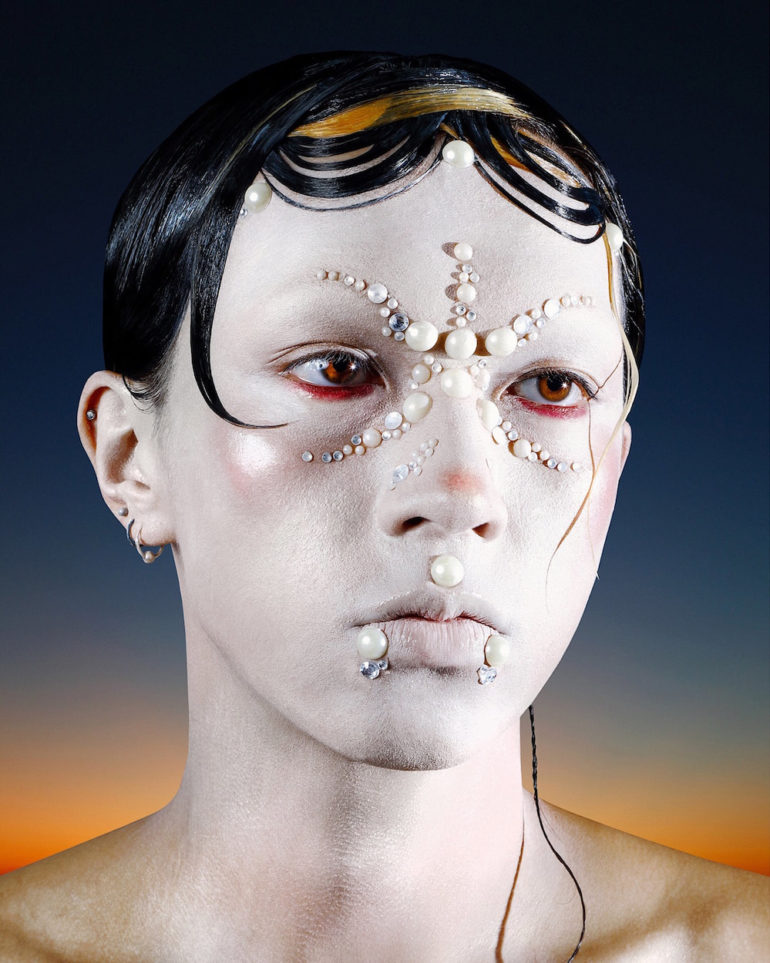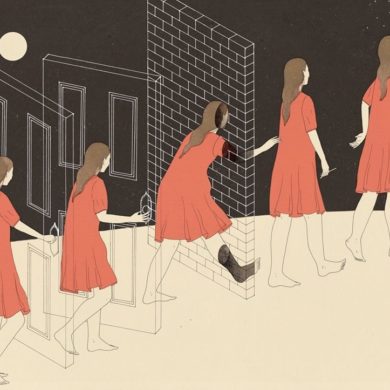Photo by Brian Vu @brianvu
What is beauty? Consciously and subconsciously practiced, I believe raw, true beauty is authentic, unapologetic, fluid and genderless; free, limitless expression. If you live your truth, it inspires others to live theirs. The people I surround myself with and admire are truly themselves, ever-evolving and redefining the world. That is beautiful. Beauty is about embracing our “imperfections”, taking risks, being vulnerable, being inclusive and intersectional and holding ourselves accountable.
However, commercially and socially, we are taught that beauty is rigid and binary. Fitting molds, self-hatred, being marketable and being sexualized has become our idea of “normal.”
When it comes to makeup, the binary is suffocating. Expressive makeup — and makeup in general — is deemed feminine by default. Those who identify as men tend to avoid putting on makeup for fear of expressing femininity or coming off as queer. Feminity is seen as a weakness. Apparently only women can have feelings, and emotions equal “weakness.” The world equates strength and power with emotional rigidity. Hyper-masculinity forces people to bottle up and bury their emotions until they explode. Men aren’t allowed to have emotions. This causes both a lack and fear of vulnerability and compassion. A lot of evil and danger is born from these ideas of hyper-masculinity and raising men to be hetero and “strong”.
This binaristic dynamic isn’t healthy, but if the rest of the world starts gearing toward a fluid future, we can begin to collectively embrace it. By allowing our differences, we can embrace ourselves and seek emotional depth as power. But populations are resistant, there’s no urgency as long as we individually continue to build and foster communities that live by these sentiments. Where we can feel safe surviving amongst chaos.
Beyond the gender binary, there are many toxic standards touted in society and media that exclude people of color and queers. Even today, and in the majority of Hollywood, “beauty” typically means white, cisgender and thin. The current shift is welcome, but slow. We are taught from a young age that beauty is impossible, a gift. Physically, something you are either “blessed” with or envious of. Socially, beauty is often equated to whiteness and therefore “unachievable” for most people of color. Growing up in “white america,” I often compared my worth to others. Feeling lower and less appreciated or prioritized than my white peers, and this still happens. Comparative culture makes us constantly measure our worth by our beauty and our productivity. Because of disposability culture we leap at opportunity.
I see a lot of brands hopping on the gender-fluidity bandwagon. It can be problematic in many ways, but it’s an attempt. At least a few bigger brands, whether it’s honest solidarity or for social gain and capital, are catching on.
But it’s only productive if it’s paid. Most brands don’t hire trans people and even less trans people of color. Casting companies cast hetero white people to play us. When we are hired, it’s rarely compensated and often for trade or exposure. Most of the time we aren’t even credited for our work, and it hasn’t been long since we weren’t in the picture at all. Most importantly, Black trans folx experience unemployment four times the rate of the general population, and are eight times as likely to be living in extreme poverty.
Specifically, these are people you should hire. They need and deserve a lot more than exposure. Exposure isn’t tangible and most of the time unrealistic. Likeness cannot be stolen and sold. Gender-fluidity, our imagery and color are becoming exponentially trendy in the fashion industry, but as long as it pays it’s a small step toward normalizing these individuals and our dialogues. We have to be uplifted for good reason.
While the world revolves around the binary, fluidity embraces the spectrums. For myself, fluidity allows me to aim toward spiritual freedom. I practice spiritual and emotional growth through my craft. I’m not afraid to experiment. I’m not afraid of societal expectations. I’m not afraid to perform on a daily basis. All marginalized bodies can’t be, for safety. To practice compassion you have to be compassionate with yourself. You cannot embrace others until you embrace yourself. I can say almost every act of hate is because of fear or lack of understanding. Humans deflect irritation and most fail to confront these feelings as a chance to receive. One person’s momentary discomfort is another’s life. If you allow yourself to listen, learn and embrace discomfort you are practicing empathy. We have to empathize with communal grief. A fluid, more compassionate and sensitive future could hold the key. As long as we keep listening, lending our hands and making the weight of each other’s pain lighter, we will beautifully foster. We must be patient. We must be gentle. We move on so quickly without taking a moment to appreciate the present, our bodies and accomplishments in the present. Never forget to honor them. We are allowed to be proud of ourselves.
Credits:
essay written by Zah @zah
We are one of 30 global youth platform partners in the launch of an initiative by CHIME FOR CHANGE @ChimeForChange and Irregular Labs @weareirregular to explore gender and our fluid future.
Check out the other content and partner platforms here:
https://www.irregularlabs.com/gender



